We are going to look at a topic that’s not talked about much on survival sites, but it’s something that we’ve wanted to cover for a while. We’ve touched on various aspects of living off the grid in an RV or trailer, but we haven’t talked much about the boondocking lifestyle or how one might survive if they found themselves having to live in a vehicle.
I was going to write this article myself, but I found someone with real-world experience who has gone through some tough times and has actually had to live in a vehicle to survive. Since nothing beats real-world knowledge and experience, I’ve asked him to talk about the lifestyle and provide some tips on how someone could live in a vehicle, either by choice or because they found themselves in a desperate situation.
So let’s jump in and have a go at it…
What is Boondocking?
Boondocking, sometimes called dispersed camping or dry camping refers to RV camping outside of a designated campground. The term is pretty broad, but in general, it can include anything from parking in a public parking lot for a day or two to staying on public land for weeks at a time. Broadly speaking, in some circles boondocking has also been extended to include living in a van or even in small trucks and cars.
While purists might focus on the voluntary aspect of RV boondocking, I’m going to take a look at the nomadic lifestyle from multiple different aspects.
What might cause someone to live a nomadic lifestyle out on the open road?
- Rising rents in urban areas, combined with stagnant wages have forced many people to live out of their vehicles or RV’s.
- In other cases, choosing to boondock in a van or RV has become a lifestyle choice, as modern nomads wander across the US to enjoy a bit of freedom.
- Some do it temporarily, as a way to save money on vacation or experience something a little different and not be tied down to a formal campground.
Whatever your reason for boondocking — survival, hobby, or lifestyle choice — there are a lot of things to consider.
Since OFFGRID Survival is primarily focused on preparedness related issues, we are going to look at the lifestyle from a survival perspective. There are tons of online resources for RV boondockers who can support themselves or treat it as a hobby. But for people forced into boondocking, or for those who choose it as an alternative economic choice, there are a ton of other considerations that don’t get discussed much, so let’s dig in.
Choosing a Boondocking Vehicle (If you can)

Let’s assume you are lucky enough to be able to select the kind of vehicle you want to live in. You’ve got a wide range of choices. You can choose an RV, a van, or some other personal vehicle.
For many boondockers, the ideal vehicle is some sort of self-contained RV. An RV motorhome combines transportation and housing and gives you a level of comfort beyond any other type of vehicle discussed in this article.
But there are some other options:
- A conversion van will work if you are willing to give up amenities.
- Travel trailers and fifth wheels offer the chance to use the tow vehicle as transportation, but also offers tradeoffs.
- At the bottom end is roughing it in a car, truck or van with minimal improvements.
Let’s consider each in turn.
Living in an RV

Motorhomes are fully self-contained and require no vehicle to tow. Depending on the size and age, the quality of the interior and amount of creature comforts varies. At a minimum though, they should be fully self-contained in terms of sanitation, cooking and sleeping. On the upper end, some motorhomes resemble small apartments and are very nicely laid out.
From a preparedness and
survival standpoint, motorhomes are always going to be larger than other
vehicles, and offer little or no practical stealth if you are trying to keep a
low profile while on the road. Plus, you have to tow a small car with you,
carry a bike or scooter, or rely on the motorhome itself for transportation,
which can be a real problem depending on the size of your RV.
If you don’t have to keep a low profile, and want all the comforts of home in a
single vehicle, motorhomes are the way to go for boondocking. But this is an
article about survival, so let’s look at some more practical options.
Living in a Travel Trailer or Fifth Wheel
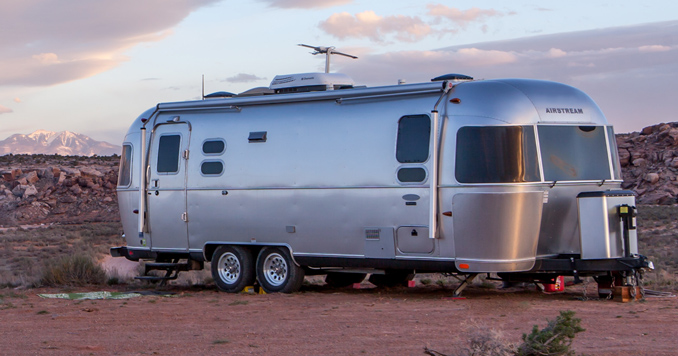
Travel trailers and fifth wheels might be an ideal compromise for survival boondockers. They feature many of the amenities that you are used in a normal home or apartment but they give you the ability to size down and live a life of comfort while out on the road.
A big advantage here is that you are free to use your tow vehicle without having to drag the trailer around everywhere you go. It gives you a great amount of freedom, but at the same time requires that you feel secure in your camping place.
Some things to keep in mind:
- Trailers can be picked up relatively cheaply, and some ultra-lights or smaller trailers can even be towed with a common car.
- If you are going with a higher-end fifth wheel, keep in mind that while you will get more space, they do require special hitches and modifications to a pickup truck to be used.
- Assuming you can find a place to park where it is safe to leave your RV, you can use the tow vehicle to go into town for groceries or work.
Living in a Tent Trailer
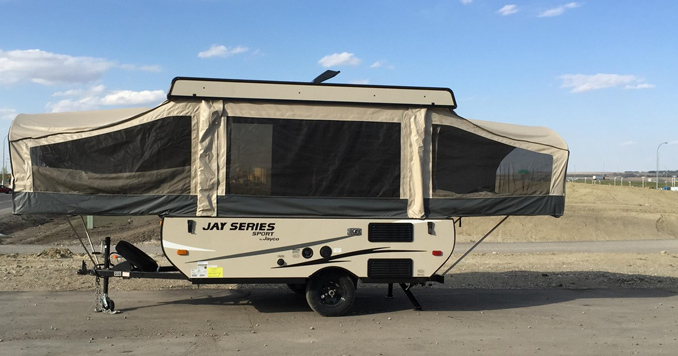
If you are desperate, or on a tight budget then there is the option of living out of a tent trailer. I’m not going to lie, this isn’t the best long-term option but it’s far better than living in a regular tent and offers some amenities – you may even be able to find one with water hookups and sanitation facilities. These are best for casual use (or desperation use) but they are easy to tow, take up little room, and they are easy to pack up and move at a moments notice.
A couple of things to keep in mind about Tent Trailers
- They are easily stolen due to their size. However, if you don’t mind primitive living, but want a few more comforts than are afforded by a tent, a tent trailer might be a good choice.
- They are harder to heat than a traditional RV.
- You’re not going to be able to boondock at a truck stop, Walmart, or other places where you can get away with parking an RV.
Living in a Van
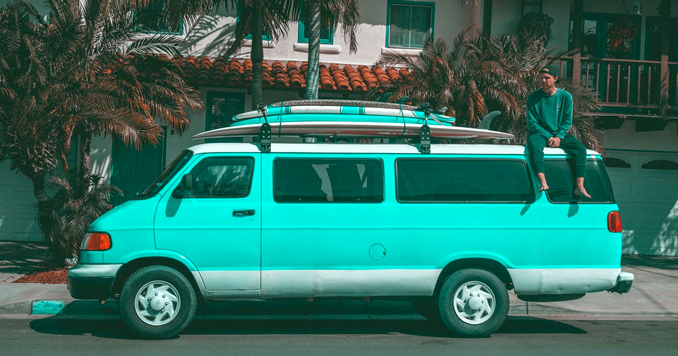
If you want some of the comforts of a motorhome, but can’t afford the price tag, you might want to consider their smaller, more discrete cousin: the van.
Van can range from everything from custom built camping vans with normal household amenities and possibly a portable toilet to on the other end of the spectrum just unrolling a sleeping bag in the back of an old work van and calling it a day.
There are entire lifestyles that revolve around van life and living or camping in vans, and some van owners have built amazing custom camping vans. There are a lot of tradeoffs though, most involve limited sanitation and cooking facilities, and even more reduced living facilities.
If you have the chance to set up a proper camp, a van is a great base of operations and gives you a platform to “spread out” from. If you have to keep a low profile, a van is still pretty obvious, but with the right looking one, you could probably make a decent effort at passing as a common work vehicle.
Living in a Car or Truck

Living in your vehicle probably ranks in the top of the shitty options list. I’ve done it myself, and it isn’t pleasant. But it is something that many people do every night due to having no other options. If you have to live in a car or truck, ideally you can choose one that at least lets you lay down and sleep in the back in relative privacy.
- Vans or trucks with canopies or camper shells are ideal choices for that. But if you use a camper shell, you do lose a lot of stealth.
- Camper shells turn the back of a pickup into a makeshift RV, but rarely offers more than a stove, a sink with a small water tank, and maybe a tiny fridge. But they are a good way to turn a truck into a boondocking home though.
- If you are reduced to sleeping in your car, try to pick up a cheap van. You’ll at least have more room and privacy. If you cannot do that, try to park in clean, well-lit areas, keep the interior of your car clean, and keep yourself looking tidy. Avoid drug and alcohol use, and obvious signs of living in your car.
While this can be a crappy way to live, some people do it by choice and do it very successfully. So remember, sometimes it’s simply your frame of mind and how you approach your circumstances that defines the outcome of your situation. For instance, check out this couple who has been living in small vehicle for years now while successfully running businesses and living an adventure of a life:
Vehicle Living Survival Tips: How to Live in Your Car
Let’s say you’ve got the vehicle you want to boondock in. How you survive in it will vary wildly depending on the type of vehicle. With that in mind, if you have a fully self-sufficient RV of any sort, you are miles ahead of the game. I’m only going to briefly talk about RVs, as living in them is going to be a hell of a lot easier than any other option.
When I say self-sufficient or fully self-contained, I mean this to be a vehicle with hot and cold running water, a refrigerator, cookstove, shower, toilet, and sleeping/living accommodations. They may not be luxurious, but you’ll have all the discomforts and some of the comforts of home.
Considerations for the self-contained boondocker:
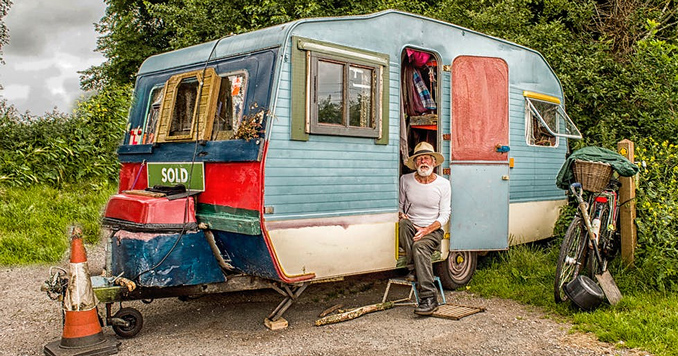
The self-contained boondocker needs to be concerned with keeping potable water in their tanks, safely and legally disposing of wastewater and sewage, ensuring their batteries are charged and making sure they have plenty of propane in their propane tanks. The rest is general maintenance, best learned through consulting the manufacturer’s literature.
Fortunately, water and sanitation can be handled at any number of formal RV dump sites in campgrounds and rest areas throughout the country. If you are boondocking away from traditional campsites, you’ll have to make a regular effort to make use of them, so make sure your RV is road worthy. Although, if you are fortunate enough to park on private land where you can access some sort of sewage system and water line, you are miles ahead of the game.
Living in a vehicle that is not self-contained
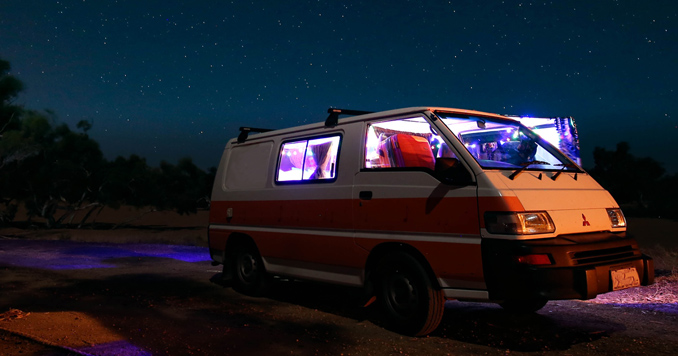
If you are not fully self-contained, life gets harder real quick. If boondocking is a hobby or a means to travel, it isn’t so bad. If you are forced to live in your vehicle during an emergency or for economic reasons, it’s pretty rough.
Making your vehicle as comfortable as possible:
- As a general rule, you’ll want to have a warm blanket or sleeping bag, and a small pillow. The less self-contained your vehicle, the more you need to see to your comfort. Don’t neglect your security.
- There are a number of small propane heaters that can be used to keep your vehicle warm that uses disposable propane cylinders. Only use these with adequate ventilation, or you run the risk of carbon monoxide poisoning.
- Consider wiring a second battery into your vehicle’s power system. This ensures you can charge small electronic devices, while still being able to start your car.
- Unless you are parked near a restroom, you might have to relieve yourself into a portable container. Pee jugs are common, and there are ways for women to make use of them as well. Keep hand sanitizer and maybe some extra wash water handy.
- Cooking can be handled on a small camp stove, allowing you to make soup, or quickly grill some meat and veggies. If you aren’t living in a van or truck, you might have to cook outside. Cooking your own meals saves on eating out, and stretches your resources further.
Safety Considerations:
- Keep all your doors locked, and where legal, consider having some sort of weapon to protect yourself from people who might see you as an easy target.
- Be aware of your surroundings. Never park in an unsafe location if you can help it. Consider the risks of natural disasters or human predation. Nobody wants to wake up to a gangbanger breaking into their car, or a river overflowing its banks.
In a nutshell, living in car or truck is like an extended camping trip, and when you treat it that way, you’ll find your quality of life improves.
Power Generation: How to find Power when Living in a Vehicle

If you are fortunate enough to have a fully contained RV, you’ve probably got an onboard generator. If not, it is stupid easy to hook up an external generator to your system. From there, it’s just a question of how you choose to use the generated power.
You’ll want to have a sufficient battery bank to suit your needs, and when possible solar panels to help keep them charged. Remember, when boondocking, security, privacy or good manners may not always allow for the use of a generator, so you might need to use more passive means like solar to keep your batteries charged.
For those living in van, camper, or car, you do have options! Simply running your engine will keep batteries charged if you can afford the fuel. Small solar panels exist that can charge individual devices like tablets.
When living in a less contained vehicle, small solar panels charging a portable battery pack that can run your mobile computing devices might be your best option.
Here are a couple good portable solar panels and power packs that we recommend:
- Goal Zero Nomad 20 Solar Panel
- SunJack 20W Solar Charger + 2x10000mAh Power Banks
- Jackery Portable Power Station Generator
In all circumstances, if you have the need and means, a portable generator can be of great use. However, consider that when living in a van or car, it will take up valuable space when not in use, and you may not really need that much power output. Living in a restricted space also means using less electricity. Outside of interior lighting, and personal electronic devices, there will be few electrical items that you’ll be using, and fewer still that justify the output of a generator.
In most cases outside RV, camper and some forms of van living, you’ll be best suited by a couple small solar panels, a portable power pack, and a spare onboard deep cycle battery to charge off your alternator when possible.
Health Sanitation concerns when living in a vehicle
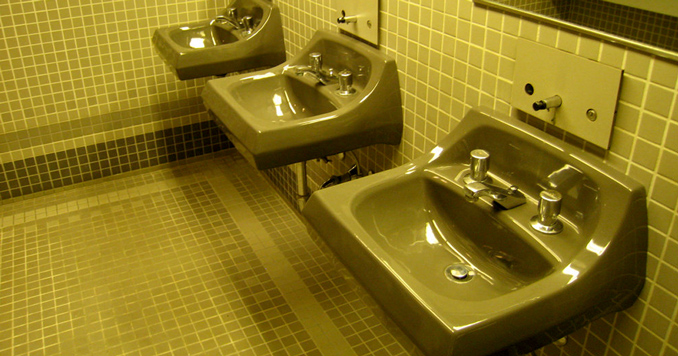
This is another mixed bag and one I’ve touched on to some extent already. As always, self-contained RV’s are king here. Having onboard waste tanks, and some form of running water beats peeing in a jug, digging a hole, or looking for a public bathroom.
If you lack those amenities, you are rapidly becoming more primitive in your boondock sanitation. Various self-contained portable toilets exist, but keeping the rest of yourself clean can be a challenge. At a bare minimum, you should have hand sanitizer, and the ability to clean your hands, face, armpits, feet and nether regions. Anything you can do beyond that is a vast improvement.
In some cases, you can use one of many portable showers on the market, although these are really meant for boondocking off the beaten path. Our urban boondocker survivors will have to resort to the old tried and true quick washes in public restrooms, gym memberships, or other similar ways to keep clean.
No matter how and where you are boondocking, keeping yourself, your vehicle and your surrounding area clean is vitally important. Not only does it improve your health, but it also improves public perception of yourself, and may allow you to stay in places normally off limits, or be given a bit of a pass. We’ve all seen disgusting homeless camps, don’t let your boondocking camp become one of them.
Is it Legal to Live in Your Car? Avoiding Legal Hassles

This is a tough one, and as always it wildly varies. When you use a dedicated camping site, you won’t have any real problems. Some places like some big box retailers, truck stops and rest areas will allow overnight parking. You should verify this ahead of time whenever possible, and always, always, always be on your best behavior.
Moving away from this low hanging fruit, some public lands allow parking or camping for various lengths of time. Check local regulation. But there are a lot of gray areas, especially in urban locations that are problematic. If you are forced to boondock away from legal camping places, you are looking at parking on city side streets, in parks, or any place you would normally park a vehicle in the city.
Sometimes local authorities turn a blind eye to these kinds of situations or even have designated places where you can legally park. In other cases, you can expect to be chased off, or even ticketed. Whenever possible choose a place to park that is legal, or in places where local authorities have accepted the presence of people living in their vehicles.
Try to blend in, and make sure everything looks clean!
The better your vehicle looks, and the better
you look and behave, the better your chances of avoiding legal trouble are.
After all, who is more likely to get hassled by a cop? A crackhead, or a clean,
well-groomed person minding their own
business, who might just be a traveler
passing through?
If you can’t find a reliable place to park, you might have to keep moving
around to avoid contact with authorities. The more you move around, and the less you stay in one place, the harder
it is to cite you. Having a low key vehicle helps as well.
And again, no matter what your boondocking vehicle is, don’t act like a jackass.
It ruins it for everyone, regardless of the legality of where you are parking.
How To Earn Money While Boondocking

When you are boondocking, there are actually a lot of ways to earn money. I once was homeless living in my car, and holding down a full-time job. Suffice it to say, I wasn’t living in my car for long, but there are plenty of ways to make cash.
Temp Agency Work
Temp agencies often offer skilled, and unskilled people a chance to earn money
on short term jobs. While the job market
varies from city to city, the more skills you have, the more likely you are to
get a decent temp job. Or you might get stuck selling hotdogs at a big league
stadium. But hey, a buck is a buck, right?
Working Remotely
There are also a lot of remote work opportunities. Legitimate work from home jobs exist, and you can find them on places like Upwork or Fiverr, although the pay can vary and tend to require some white-collar skills, a computer, and an internet connection. Typically these are content writing, graphics design, or coding jobs. You might also be able to find jobs with an answering service or as a virtual assistant if you have the equipment and skill set to do the job.
Seasonal jobs: Traveling from city to city.
If you have the physical ability, there are seasonal farm jobs across the US. In some places, labor shortages make these jobs very attractive short term propositions if you can handle the work. Construction season often provides a means to earn seasonal income, as do various commercial fishing seasons. In the Western US, you might be able to get seasonal work on fire crews fighting wildfires.
Campground Hosts and Jobs
The great thing about these types of jobs is yo not only get your own personal spot to park and live, but you’ll get paid and also usually have full access to free WiFi ad Utility hookups.
- KOA WorkKamper Program
- US National Forest Camp Host Program
- Amazon CamperForce: Seasonal assignments in a variety of locations.
Delivery Jobs
If you have a suitable car or bike, there are also various delivery jobs you can get through places like Uber or even Amazon and Wal-Mart. In fact, the so-called gig economy is booming, and if you can match a skillset to a gig, you have the chance at extra or even regular income.
Use your imagination and your skills!
If you have certain talents or skills, you can also advertise locally on places like local Facebook groups or Craigslist.
As
you can see, many jobs suitable for boondockers are short term, seasonal or
online. You will need a varied skillset, a willingness to work, and reliable
access to a computer, internet, and
smartphone. The urban boondocker living in their car could earn money in a
public library, or for the cost of a cup of coffee,
they can get a few hours of WIFi in a coffee shop.
The key to boondocking money is to think on your feet, be adaptable, and be
willing to work. It might not be as stable as a regular 9-5, but you can make a
go of it.
The Roadwarrior: Living the Nomadic Boondocking Lifestyle

Boondocking can be a rewarding off the grid experience when done with a well-built RV, camping van, or even a tent trailer. It can be a full-time lifestyle that allows you to wander the country, and live free of the limits of traditional living.
It can also be a survival tool for those who are suffering from financial hardship and have no other way to live.
I have variously lived in my car, and several RV’s, both on and off the grid. It is surprisingly easy to be comfortable and live a quiet, hassle-free and rewarding life. It can also be pure misery in the dead of winter when the inadequacies of your preps hit you like a ton of bricks.
Many boondocking guides are focused on the RV living aspect, and disregard the other elements of people forced into it, or who choose to live a more nomadic life. It is impossible to do more than a broad survey in an article like this, but you should come away with a solid grounding in how to approach different elements of boondocking, and more importantly an idea of the mindset needed.Boondocking is simply an evolution of the old urge to travel and be free, or conversely to make do with what you have and try to better yourself in the process. No matter where you are on the boondocking spectrum, it doesn’t have to be hard, and it can even be pretty darn nice.




Great article which brought back memories some as much as 53 years ago (75 now). Times were tough and living in vans (campers, garage floors, RV’s) was a necessity, but a rewarding experience. So now I can relate to those who are in same predicaments. Life now is comfortable, but occasionally I still camp out, mostly in a RV and/or tent, but not because of the “have too” issue. While out at a camp site I still practice survival techniques, why, because I can. Life is great….
This is a lot of good information. I have never boondock for long periods of time, but I have slept in a van while traveling. I tried staying in a park but found out it closed up at night and was ran off by police. It was not a bad experience, but I thought he would be the right guy to ask as to where I could park over night. He was real nice about it and gave me a good location. Well an hour after I got there the police showed up with a dog and asked to search my vehicle. He said they had problems with drug runners and I had out of state plates. Well long story short I let them search they found nothing and I was able to sleep comfortably that night knowing the police was keeping an eye on my surroundings. Again not at all a bad experience but if you are not doing anything illegal you can get some free protection, after a quick search.
Great information and very accurate!
Good overview of the RV/VAN/boondocking lifestyle. So many people are living on the road full time/part time who also have a great interest in Off Grid, SHTF survival. I have not seen much info around the web for these type of people that might be a central point of information, kind of like a Travelers American Redoubt blog. Offgridsurvival.com is a welcome find and this article was informative. Thanks.
spending the night at a truck stop, as long as you buy their fuel. Power Generation if you have a quiet generator. Fire up a loud one and you will be the bad guy of the area. Also use Propane generator. fuel keeps long term, and no carb failure like with gas. Propane is easy to change out on the road. Almost all towns have a swap propane convience store or Propane dealer. Log on map where sewer dump is available. Most states have roadside parks that have dump stations for rv.
This is an interesting read. I’ve just recently become homeless and living in my Ford Escape Hybrid with my service dog, he’s a great watch dog and listens really well. Vincent is a Labrador Retriever who just turned 7 yo in August’21. We are just two peas in a pod. I recline my seat to sleep and he lays his head on my shoulder. So this article was quite informative. I’ve been hitting a few Walmart parking lots. Who’s very well known for allowing boondocking fir maybe 2-3 nights. You can feel pretty secure there because of the lighting and cameras on-site. However it isn’t so great if you are trying to cook out or use a urinal in your car. I have a portable shower head, hose and pump which has suction cups to attach to the side of your vehicle. It charges on an USB port and runs for up to 60 minutes. A collapsible bucket works well for this situation. When there’s a privacy issue, hang a showers curtain. Of course not in a Walmart parking lot. I also have a high voltage jumpstart generator, a mid sized generator and a small generator that came with two hanger type lights and a small solar panel. It sits in my dashboard and collects the rays while I drive. I also have a built in inverter in my car. This is where I charge my other generators. I also have a few power banks. So, I’m pretty well set for power. I have a cargo carrier on the rooftop where I store various items. I have a mid sized cooler in the far back of my hybrid SUV. Although it does take up lots of space, plus I have to keep buying block ice for it to last 2-3 days. So I’ve been searching around for one of those fridge/freezer combos. And maybe use the cooler as a storage unit for supplies, and put it on the roof. My sleeping situation is not so cool. I do have a futon mattress in storage I’ve been considering. This video gave me an idea to build a platform that will hold my necessities and put the futon on top of it. My dog and I love to sleep together. It would take a lot of work to get it set up right. I’ve seen those tents that fixes onto the side of you vehicle. Kind of interesting. I do have a nice size tent, which sleeps 8 and allows me to stand up inside. But it takes two people to set it up. So it’s a work in progress. Actually I have been trying to make a deal on a 10 acre piece of land I’ve fallen in love with. It sits up on it’s own little hill. No one can see me and all I see is mountains and sky from a 360 viewpoint. And it has water. I’m a certified permaculture design specialist. So I’m waiting to go off grid permanently. Build a house out of Cobb. Cooler in summer, warmer in winter. This is in Arizona by the way. This property is just about a mile and a half north of the Gila River. My dog would love playing in the water while I fish. I’m also a certified herbalist. So my plan is to make a little business with some tinctures, ointments and such. Plus grow a garden and sell half of it to my herbal clientele. What a way of life!! I have put in a proposal to these friends of mine who own the land. They got burnt out of the Northern California Mountain fires a couple years ago and now they are living in Porto Rico. As I’m waiting to hear back on that proposal… I’m boondocking around the Phoenix area where I currently own three storage units. So I’m trying to liquidate most of those assets. I’m so looking forward to a life off the grid.
Bottom line on the article is that it’s very informative. Thanks for your time and efforts in setting up this website/blog! People are really beginning to wake up to new ways of existence. Thx again for the info here. Blessings to all those who participated as well.
Lived in a car for several months about 5 or 6 years ago. I wasn’t allowed to stay at most of my family members’ or friends’ houses due to various arguments we had over the years. Every now and then I’d sneak a night or two at a friend’s place so long as I did some work for them. In exchange, I got a hot shower, a bit of cash, and somewhere warm to sleep. It’s safe to say that I didn’t enjoy it at all. But that was mainly because I had absolutely nothing to my name. Not even the car I was sleeping in was mine. I was just borrowing it at the time. Fast forward to the present day, now I have a huge chunk of questions about myself and just want to get out of where I live and be free of all the stress. Mainly due to it falling apart around me, literally, and my neighbors being nosy as crap. An RV is CERTAINLY the way to go, yes. Agreed. Van is second, I’ll agree. But seeing as how I’m unemployed and living off SSI, a truck seems the best way to go for me. My main argument for this is because of the utility of the bed. It’s big enough to sleep in, haul things for odd jobs, and I can always gather up some decent scrap wood from pallets and build a makeshift camper on the back. Already have the plans drawn up for it. Granted the downsides to this idea are pretty big. One of which is I’d have to be able to swing by gas stations and such for a bathroom. The other isn’t having heat for the winter. But overall my main problem would be actually getting a good running truck, seeing as how I live in SC and trucks are an arm and a leg… Yeah. Good thing I’m selling my car to pay for one. Leaning towards a Ranger, s10, or Tacoma but also debating on a bigger truck, like an F150, Chevy 1500/GMC Sierra, or Tundra. Don’t get me wrong, my Impala is pretty big and has a decent-sized back seat to sleep in but it’s NOT comfortable. At all. I’ve tried during the last argument with my live-in-landlord. Ready to just get out of here.
Hi Woodrow, I hope all is well for you! Im also living in my vehicle and just wondered if you have any helpful tips? Thank you